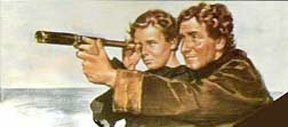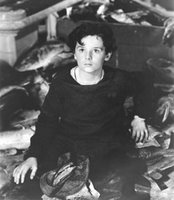The Night of Weeping
The Night of Weeping by Horatius Bonar (1808-1889)
"I do not mean, as I have said before, that the saint is ever to be gloomy. No. Gloom and melancholy are not our portion. "The lines have fallen unto us in pleasant places." They are not the inmates of a soul that has tasted the joy of pardon and is walking in light, as a happy child with a loving father.
But true joy is a serious thing. Its fountains are deep. It is the waking up of the heart's deep springs. Mirth and levity are not joy. They are too shallow to deserve the name. Like the sun-flash on a stagnant pool, they are a mere surface gleam of light. There is nothing in them of the calm radiance illuminating the ocean depths many a fathom down, as if the waters themselves were a mass of solid sunshine, and remaining amid the heaving of the billows, unbroken and unobscured.
In coming to Him, who is the fountain of all gladness, the saint of God bids farewell to gloom. Tribulation he may have -- no, must have -- but not gloom. That has left him forever since the day he knew the Savior, and opened his ears to the joyful sound. Peace is now his heritage. ...
It is through tears that truth is best seen. When looked at through this medium, objects assume their right proportions and take their proper level. ..
Such especially is the life of the saint! He not only knows that there is an eternity, but he has seen and felt it. ... He not only knows that there is such a thing as forgiveness and eternal life, but he has found them, he has tasted them; his eyes have been opened, and he has now come into the very midst of realities. They compass him about on every side.... especially as he "looks for that blessed hope, even the glorious appearing" of the Lord....
Affliction is full of warnings. It has many voices and these of the most various kinds. It speaks counsel, it speaks rebuke, it speaks affection. ...
1. Affliction says, "Love not the world, neither the things that are in the world. If any man love the world [referring to the world system, not the people of the world] the love of the Father is not in him." (I John 2:15).
2. Affliction says, "Take heed and beware of covetousness" (Luke 12:15). Riches cannot help, neither earthly comfort avail us in the hour of grief. They cannot dry up tears, nor reunite broken bonds. ... It is then we find that we need a "treasure in the heaven that fails not."...
3. Affliction says, "abstain from all appearance of evil" (I Thess 5:22). "Hate even the garments spotted by the flesh."... It is not merely abstain from evil, but from all appearance of evil. Suffering teaches us to shrink from sin -- even from the remotest and most indirect connection with it. It says, "Oh, do not that abominable thing which I hate!"
4 Affliction says, "Do not grumble against one another." (James 5:9). Let there be no halfhearted affection in the family of God. Let there be no envy, no jealousy, no misunderstandings among the brethren. Why should we be less than friends who are both fellow-sufferers and fellow-soldiers here? ... Yet oftentimes it needs affliction to teach us this, to remove our jealousies, and to draw us together as brethren in sympathy and love.
5. Affliction says, "Keep yourselves from idols" (I John 5:21). If there be one remaining idol, break it in pieces and spare it not. Nothing is so fruitful a cause of suffering as idolatry. Nothing so forcibly displays the vanity of our idols as suffering. ...
Church of the living God! Be warned. Please not yourself, even as Jesus pleased not Himself. Live for Him, not for yourself, for Him, not for the world. Walk worthy of your name and calling, worthy of Him who bought you as His bride, worthy of your everlasting inheritance.
"I do not mean, as I have said before, that the saint is ever to be gloomy. No. Gloom and melancholy are not our portion. "The lines have fallen unto us in pleasant places." They are not the inmates of a soul that has tasted the joy of pardon and is walking in light, as a happy child with a loving father.
But true joy is a serious thing. Its fountains are deep. It is the waking up of the heart's deep springs. Mirth and levity are not joy. They are too shallow to deserve the name. Like the sun-flash on a stagnant pool, they are a mere surface gleam of light. There is nothing in them of the calm radiance illuminating the ocean depths many a fathom down, as if the waters themselves were a mass of solid sunshine, and remaining amid the heaving of the billows, unbroken and unobscured.
In coming to Him, who is the fountain of all gladness, the saint of God bids farewell to gloom. Tribulation he may have -- no, must have -- but not gloom. That has left him forever since the day he knew the Savior, and opened his ears to the joyful sound. Peace is now his heritage. ...
It is through tears that truth is best seen. When looked at through this medium, objects assume their right proportions and take their proper level. ..
Such especially is the life of the saint! He not only knows that there is an eternity, but he has seen and felt it. ... He not only knows that there is such a thing as forgiveness and eternal life, but he has found them, he has tasted them; his eyes have been opened, and he has now come into the very midst of realities. They compass him about on every side.... especially as he "looks for that blessed hope, even the glorious appearing" of the Lord....
Affliction is full of warnings. It has many voices and these of the most various kinds. It speaks counsel, it speaks rebuke, it speaks affection. ...
1. Affliction says, "Love not the world, neither the things that are in the world. If any man love the world [referring to the world system, not the people of the world] the love of the Father is not in him." (I John 2:15).
2. Affliction says, "Take heed and beware of covetousness" (Luke 12:15). Riches cannot help, neither earthly comfort avail us in the hour of grief. They cannot dry up tears, nor reunite broken bonds. ... It is then we find that we need a "treasure in the heaven that fails not."...
3. Affliction says, "abstain from all appearance of evil" (I Thess 5:22). "Hate even the garments spotted by the flesh."... It is not merely abstain from evil, but from all appearance of evil. Suffering teaches us to shrink from sin -- even from the remotest and most indirect connection with it. It says, "Oh, do not that abominable thing which I hate!"
4 Affliction says, "Do not grumble against one another." (James 5:9). Let there be no halfhearted affection in the family of God. Let there be no envy, no jealousy, no misunderstandings among the brethren. Why should we be less than friends who are both fellow-sufferers and fellow-soldiers here? ... Yet oftentimes it needs affliction to teach us this, to remove our jealousies, and to draw us together as brethren in sympathy and love.
5. Affliction says, "Keep yourselves from idols" (I John 5:21). If there be one remaining idol, break it in pieces and spare it not. Nothing is so fruitful a cause of suffering as idolatry. Nothing so forcibly displays the vanity of our idols as suffering. ...
Church of the living God! Be warned. Please not yourself, even as Jesus pleased not Himself. Live for Him, not for yourself, for Him, not for the world. Walk worthy of your name and calling, worthy of Him who bought you as His bride, worthy of your everlasting inheritance.








